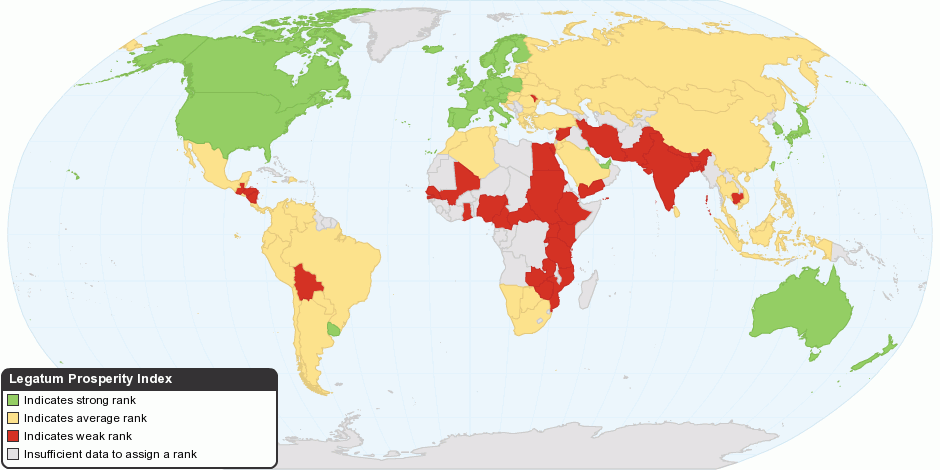This map shows the Prosperity Index for 110 countries.
2010 Key Findings:
- Entrepreneurship and opportunity correlate more closely to a nation's overall prosperity than any other factor.
- It pays to be a democracy.
- Changes in the "social fabric" of a country can lead to big changes in national prosperity.
- Prosperity is about balance.
- Material wealth cannot be explained only by economic factors, and happiness cannot be explained only by subjective emotions.
- Choice and opportunity matter more to happiness than making a lot of money quickly.
- Two Europes are emerging.
- Improved governance is emerging as a key driver of prosperity in Sub-Saharan Africa.
- It's hard to be prosperous as a large country.
- Economic growth is not enough for the BRICs (Brazil, Russia, India, and China).
What is the Prosperity Index?
The Legatum Prosperity Index is the world's only global assessment of wealth and wellbeing; unlike other studies that rank countries by actual levels of wealth, life satisfaction or development, the Prosperity Index produces rankings based upon the very foundations of prosperity – those factors that help drive economic growth and produce happy citizens over the long term.
How the Prosperity Index is calculated?
The Prosperity Index accounts for 90% of the world's population and is based on years of statistical analysis and research of objective data and subjective responses to surveys. The data comprises 89 different variables organised into nine sub indexes – each identified as a foundation of long-term prosperity. A country’s performance in each sub-index is given a score, and the overall Prosperity Index rankings are produced by averaging the scores of the nine sub-indexes for each country. Those countries that perform well across each sub-index do best in the overall rankings.
The eight sub-indexes are:
- Economy - Stable and growing economies increase per capita income and promote the overall wellbeing of its citizens.
- Entrepreneurship & Opportunity (E&O) - A strong entrepreneurial climate in which citizens can pursue new ideas and opportunities for improving their lives leads to higher levels of income and wellbeing.
- Governance - Well-governed societies enjoy national economic growth and citizen wellbeing.
- Education - Education is a building block for prosperous societies.
- Health - A strong healthcare infrastructure in which citizens are able to enjoy good physical and mental health leads to higher levels of income and wellbeing.
- Safety & Security - Societies plagued by threats to national security and personal safety cannot foster growth in average levels of income or wellbeing.
- Personal Freedom - When citizens enjoy their rights to expression, belief, organisation, and personal autonomy in a society welcoming of diversity, their country enjoys higher levels of income and social wellbeing.
- Social Capital - Social networks and the cohesion that a society experiences when people trust one another have a direct effect on the prosperity of a country.
For more information about each methodology please follow the reference link below.
15 years ago

